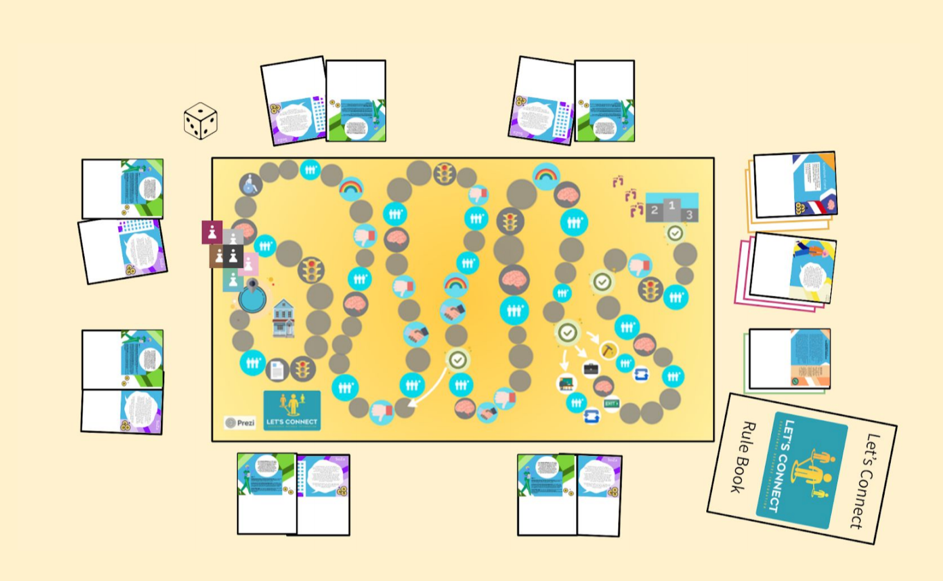LET’S CONNECT
By: Veerle Korsten, Kyra Dols, Stella Levin and Juul Koster
Hello, and welcome to The Hague!
For many of you, the first step may be to go visit the beautiful Binnenhof, seat of the Dutch parliament, or the Mauritshuis, to steal a glance at the iconic Girl with the Pearl Earring. Some might want to taste traditional Dutch cheese or pannenkoeken. For others however, arriving in The Hague has nothing to do with vacation or leisure. Instead, it is the prelude to a much bigger journey: one of integration and connection.
In the board game Let’s Connect, players step into the shoes of newly-arrived status holders and try to complete The Hague’s integration track. Making acquaintances and friends, creating a social network, passing bureaucratic checkpoints: The player who completes these steps the quickest wins!
OBJECTIVE
Let’s Connect allows you to complete the Hague’s integration track through forming connections and building a network. For the first time, it is possible to immerse yourself in the world of a status holder.
Before the game, you will draw a character card: you become that status holder for the time being. You must complete the integration trajectory by collecting as many social connection points as possible. Later on, you can exchange these for friends. Throughout the game, you will have to make cultural, language, or professional friends. There are various opportunities to collect points throughout the game, but careful; you can also lose points!
Throughout the trajectory, you encounter four checkpoints. These correspond to a formal milestone in The Hague’s integration process, for example, the civic integration exam. You need to have a set number of specific friends to pass the checkpoint. Did you pass the checkpoint? That is great! You are one step closer to successful integration. When you are allowed to pass the checkpoint, you have to draw a discussion card that allows you to reflect on their integration process so far. But do make sure to continue your integration journey afterward: the player that first passes the last checkpoint wins the game!
 The Proposed Game Set-Up
The Proposed Game Set-UpLEARNING GOALS
There are 10 learning goals that the players work towards while playing the game. The game developers structured the learning goals around the model ASK to ensure a more holistic approach to the goals. ASK stands for Attitudes, Skills and Knowledge. The Attitudes goals are a person’s willingness and openness to look at an issue from another point of view. Skills are a person’s ability to perform a set task, and Knowledge is their understanding of the dimensions of an issue.
Attitude: The player recognizes
- The importance of social networks for integration.
- That integration success depends not only on one’s willingness to successfully integrate, but also on factors outside of one’s control, including, but not limited to: cultural background, family situation, transferability of skills, networking opportunities, bureaucratic delays, and personality type.
- The difficulties one faces when retaining a network, including cultural differences, time constraints, mismatched priorities, language barriers, and attitude of the host community.
- The diversity of the refugee population in The Hague.
Skills: The player works on the
- Ability to reflect on the struggle of integration.
- Ability to communicate ideas surrounding the integration process.
Knowledge: The player knows
- The different steps of the Hague integration process.
- The different dimensions of integration, including settling in, ensuring basic needs, contributing through participation, and getting a sense of belonging.
- The role the municipality and social protection providers play in the integration process.
- What kind of questions to expect on the civic integration exam.
A detailed package for distribution is currently under development.
– Struggle in the City Team